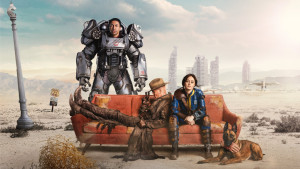Please support Game Informer. Print magazine subscriptions are less than $2 per issue
Ten More Authors Who Should Be Making Video Games

The news that gamer-beloved author Neil Gaiman is working an original video game has inspired us to look at what other authors could do in our favorite medium.
Gaiman's project will no doubt be enthusiastically British given his previous work and the fact that he's working with a studio called The Odd Gentlemen. Here are a few other video-game projects we could see coming down the pipe based on what we've seen out of the following published authors:
* * *
Brandon Sanderson, author of the Mistborn series and finisher of Robert Jordan’s epic Wheel of Time series – Sanderson’s script changes the way we think about video-game narrative construction by turning our preconceptions on their heads. Cast as an immortal time cop, the player must travel the multiverse and assassinate notable characters once the major events in their lives have transpired. Thanks to the player’s selfless actions, these figures’ stories can end and their timeline can continue on.
|
|
Stephenie Meyer, author of Twilight – Zombie games are all the rage, but Meyer’s deft touch is the first time that they’ve been able to crack the family-friendly mainstream. Players jump into the shoes of Danny, a teenager with all the usual problems like bullies and acne, but with one more secret – he’s a zombie! Cursed with immortality, super-strength, super-speed, and a devastatingly attractive body always in perfect health, Danny has to overcome his social awkwardness in order to woo the girl of his dreams so that she agrees to marry him and bear his beautiful zombie children. |
|
Stephen King, author of seriously he’s Stephen King – Famous for inserting himself into his work, King’s video game puts the player in the role of a misanthropic horror author stricken with terrible writer’s block. But when the player and his wife journey to an idyllic New England lake cabin, things go terribly wrong as the author’s twisted imagination seems to come to life…or does it?
|
|
Charlaine Harris, author of the Sookie Stackhouse novels that HBO adapted into True Blood – Harris challenges our assumptions about characters and narrative when her video game puts the player in control of the least interesting person in the entire cast. The obviously unintelligent protagonist is a foil to the sparkling wits who surround her, and choosing between the poor options she gives herself makes us think about our own lives in a new light. Everyone is naked most of the time. |
|
Orson Scott Card, author of Ender’s Game – Card has sniffed video game success with Shadow Complex and plumbed the depths of digital failure with the Majesco-bankrupting Advent Rising. His next game, however, takes the medium in a new direction with this global simulation/strategy title. The player is in charge of a counter-revolutionary media empire hell-bent on turning back the tides of social progress. Victory is achieved by convincing the entire world to follow Victorian standards of propriety. |
|
Suzanne Collins, author of The Hunger Games – Collins’ inviting, cartoony party game has kids competing in a variety of tasks. The rules are arbitrary, and success is determined by a roll of the dice more often than not. Despite the seemingly shallow setup, though, Collins uses players’ triumphs and defeats as moments to develop her surprisingly detailed characters and their relationships. Unfortunately, all of the authorial skill in the world can’t make this random, minigame-based party gameplay fun. |
|
Alan Moore, author of Watchmen – Moore’s amazing deconstruction of modern life calls into question the very bedrock of our society. His carefully chosen words and multi-dimensional characters interact with the game world in familiar ways in this narrative shooter, but by the end of the game players are vaguely uncomfortable with the actions they took that seemed like the best option at the time. Lauded as a visionary work on the level of Braid or Journey, Moore refuses to acknowledge its existence, saying that his vision has been irredeemably corrupted by exposure to the sun’s ultraviolet rays. |
|
Terry Brooks, author of the Shannara series – Brought on board by an established publisher to give literary heft to its upcoming yearly modern combat first-person shooter, Brooks pens a creative tale about Russian ultranationalists, South American weapons smugglers, and elite operators from the American military and its allies take them down in tense globetrotting adventures. Asked for comment on what ideas he has on tap for next year’s installment, Brooks responded that he is working on some fascinating ideas about dogs and next-gen fish AI. |
|
Tom Clancy, author of The Hunt for Red October and Patriot Games – Thanks to a new deal with Ubisoft, Clancy is set to have direct involvement with the upcoming Tom Clancy’s Tom Clancy: America F--- Yeah!, in which players are treated to a 45-minute video of the President of the United States (played by a digitally remastered Harrison Ford) telling them about how many times over a single United States Navy battlegroup could destroy every other navy in the world. Oo-rah. |
|
Philip K. Dick, author of Do Androids Dream of Electric Sheep?, a short story later adapted into the film Blade Runner – Just kidding. Dick’s work is responsible for more of modern sci-fi than any other artist’s. We wouldn’t have half of the variety in our incredible adventures without Dick’s prophetic visions of the future. Respect.
|
In case it wasn’t blindingly obvious, the above games do not actually exist and are in fact merely vehicles for our lame jokes.




















